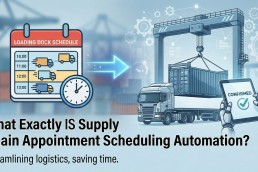Is Automating Appointment Scheduling in Logistics Difficult?

In the spectrum of freight brokerage operations, appointment scheduling has notably been one of the final processes to see widespread automation. This isn’t due to a lack of desire for efficiency, but rather the inherent complexity and “extreme nuance” of the task itself. Automating scheduling is far more complicated than standard data entry or simple rule-based automation found elsewhere.
One major challenge lies in the sheer diversity of scheduling workflows used by facilities. Brokers interact with locations that schedule appointments via email, while others use proprietary portals. Even within portal-based scheduling, workflows can have “specific nuances customer to customer”. A robust automation solution must be capable of navigating and executing these varied processes flawlessly.
Another significant barrier is the information gap. Broker TMSs and carrier TMSs often do not contain all the necessary data points required for the scheduling workflow. Much of this critical information – preferred times, specific contact methods, unique facility requirements, historical patterns, and exceptions – exists as “tribal knowledge” residing solely in the minds of experienced schedulers. Building effective automation requires the capability to capture and utilize this tribal knowledge alongside structured data.
The developers of scheduling solutions have spent considerable time “digging in deep” to build systems that not only handle the technical aspects of accessing portals and sending emails but also incorporate this vital tribal knowledge and manage the variations across workflows.
Crucially, the objective of advanced scheduling automation is not just to automate the request to book an appointment. The higher goal is to “drive optimized appointments”. An optimized appointment isn’t just any slot; it’s one that facilitates efficiency throughout the supply chain. This means drivers can “get in and out of facilities” promptly, facilities avoid “bottlenecks for carriers showing up unscheduled or not on time,” and shippers can “communicate effectively with their customers on the on-time arrival of their product”.
When considering automation tools in this space, the source emphasizes the importance of looking beyond internal time savings. True value creation involves considering “the value that you’re going to bring to your customers as well”. This includes questions like: Are you “improving performance for them”? Are you “getting ahead of exceptions”? Are your carriers “happy with the appointments that you’re booking” and are their drivers getting the necessary turn time?
This focus on driving tangible value and improving performance for all parties, rather than simply automating a task, is what distinguishes specialized scheduling automation providers and positions them ahead of general AI tools in this complex, nuanced area. It requires deep domain expertise to understand and address the intricate requirements of freight scheduling.


